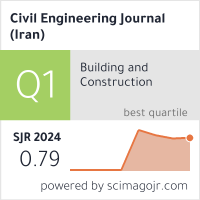The Effectiveness of Fly Ash as a Substitute of Cement For Marine Concrete
Downloads
The purpose of this research is to know the effectiveness of fly ash waste in marine concrete related to the average compressive strength to be used as a substitute for cement. The test is done for concrete base material, namely: coarse aggregate (gravel), fine aggregate (sand), fly ash, cement (PC = Portland Cement), water and additional material (superplasticizer). 10 cylinders were given each treatment with (0 %, 10 %, 20 %, 25 %) percentage of fly ash addition. The samples then soaked for 26 days in seawater. At 28th day, the sample was subjected to a compression test. Based on the results of analysis and discussion, then obtained: (1) The use of 10% fly ash amount will produce the biggest compressive strength = 65.84 MPa; (2) When compared with the average compressive strength, the sample without using fly ash (0 %) has compressive power 62.02 MPa and 6.16 % increase in average compressive strength on the addition of 10 % fly ash 65.84 MPa, but in addition to 20 % fly ash there was a decrease of 9.13 % (56.36 MPa) and in addition of 25 % fly ash the average compressive strength decrease to 22.49 % (48.07 MPa).
Downloads
[2] Stewart, Mark G., Xiaoming Wang, and Minh N. Nguyen. "Climate Change Adaptation for Corrosion Control of Concrete Infrastructure.” Structural Safety 35 (March 2012): 29–39. doi:10.1016/j.strusafe.2011.10.002.
[3] Imbabi, Mohammed S., Collette Carrigan, and Sean McKenna. "Trends and Developments in Green Cement and Concrete Technology.” International Journal of Sustainable Built Environment 1, no. 2 (December 2012): 194–216. doi:10.1016/ j.ijsbe.2013.05.001.
[4] Sobolev, K., & Soboleva, S. U.S. Patent No. 6,645,289. U.S. Patent and Trademark Office, 2003.
[5] Punmia, B. C., Ashok Kr Jain, Ashok Kumar Jain, Arun Kumar Jain, and Arun Kr Jain. Limit state design of reinforced concrete. Firewall Media, 2007.
[6] Gambhir, Murari Lal. Concrete Technology: Theory and Practice. Tata McGraw-Hill Education, 2013.
[7] Vanoni, Vito A., ed. "Sedimentation Engineering” (March 29, 2006). doi:10.1061/9780784408230.
[8] Popovics, Sandor. Concrete materials: Properties, specifications, and testing. William Andrew, 1992.
[9] Lepech, M. D., and V.C. Li. "Long Term Durability Performance of Engineered Cementitious Composites / Langzeitbeständigkeit Systematisch Entwickelter Zusammengesetzter Zement Gebundener Werkstoffe.” Restoration of Buildings and Monuments 12, no. 2 (January 1, 2006). doi:10.1515/rbm-2006-6038.
[10] Hoff, George C. "Durability of offshore and marine concrete structures." Special Publication 126 (1991): 33-64.
[11] Shah, S., and S. Ahmad, eds. High performance concretes and applications. CRC Press, 1994.
[12] Kayali, O. "Fly Ash Lightweight Aggregates in High Performance Concrete.” Construction and Building Materials 22, no. 12 (December 2008): 2393–2399. doi:10.1016/j.conbuildmat.2007.09.001.
[13] Gesoğlu, Mehmet, Erhan Güneyisi, and Erdoğan Özbay. "Properties of Self-Compacting Concretes Made with Binary, Ternary, and Quaternary Cementitious Blends of Fly Ash, Blast Furnace Slag, and Silica Fume.” Construction and Building Materials 23, no. 5 (May 2009): 1847–1854. doi:10.1016/j.conbuildmat.2008.09.015.
[14] Kosmatka, Steven H., William C. Panarese, and Beatrix Kerkhoff. Design and control of concrete mixtures. Vol. 5420. Skokie, IL: Portland Cement Association, 2002.
[15] Justnes, Harald, Lennart Elfgren, and Vladimir Ronin. "Mechanism for Performance of Energetically Modified Cement Versus Corresponding Blended Cement.” Cement and Concrete Research 35, no. 2 (February 2005): 315–323. doi:10.1016/j.cemconres. 2004.05.022.
[16] Blezard, Robert G. "The History of Calcareous Cements.” Lea's Chemistry of Cement and Concrete (1998): 1–23. doi:10.1016/ b978-075066256-7/50013-8.
[17] Anonymous. SNI-15-2049-1994. Semen Portland. Departeman Pekerjaan Umum Indonesia, 1994.
[18] Nugraha, Paul. "Teknologi Beton dari Material, Pembuatan, ke Beton Kinerja Tinggi." Universitas Kristen Indonesia, Andi Offset, Yogjakarta (2007).
[19] Snellings, R., G. Mertens, and J. Elsen. "Supplementary Cementitious Materials.” Reviews in Mineralogy and Geochemistry 74, no. 1 (January 1, 2012): 211–278. doi:10.2138/rmg.2012.74.6.
[20] ACI Manual of Concrete Practice Parts 1 226.3 R-3, 1993.
[21] Alexander, M., & Mindess, S. Aggregates in concrete. CRC Press, 2010.
[22] Urquhart, L. C. Civil engineering handbook. McGraw-Hill Book Co., 1959.
[23] Anonymous. SNI-03-1750-1990. Tata Cara Pembuatan Rencana Campuran Beton Normal. Departeman Pekerjaan Umum Indonesia, 1990.
[24] Boggs, Sam Jr. "Petrology of Sedimentary Rocks” (2009). doi:10.1017/cbo9780511626487.
[25] Sneed, Edmund D., and Robert L. Folk. "Pebbles in the Lower Colorado River, Texas a Study in Particle Morphogenesis.” The Journal of Geology 66, no. 2 (March 1958): 114–150. doi:10.1086/626490.
[26] Nkinamubanzi, P.-C., S. Mantellato, and R.J. Flatt. "Superplasticizers in Practice.” Science and Technology of Concrete Admixtures (2016): 353–377. doi:10.1016/b978-0-08-100693-1.00016-3.
[27] Naik, Tarun R., Rakesh Kumar, Bruce W. Ramme, and Fethullah Canpolat. "Development of High-Strength, Economical Self-Consolidating Concrete.” Construction and Building Materials 30 (May 2012): 463–469. doi:10.1016/j.conbuildmat. 2011.12.025.
[28] Ramachandran, V. S. Cement admixtures handbook, properties, science and technology. HJ: Noyes Publ. Park Ridge. 1995.
[29] Mailvaganam, Noel P., and M. R. Rixom. Chemical admixtures for concrete. CRC Press, 2002.
[30] Sugiharti. Optimasi Campuran Semen dan Fly Ash Pada Beton Mutu Tinggi. Malang: UM Press. Magister Studied. 2010.
[31] Kumar, Sunil. "Influence of Water Quality on the Strength of Plain and Blended Cement Concretes in Marine Environments.” Cement and Concrete Research 30, no. 3 (March 2000): 345–350. doi:10.1016/s0008-8846(99)00263-x.
- Authors retain all copyrights. It is noticeable that authors will not be forced to sign any copyright transfer agreements.
- This work (including HTML and PDF Files) is licensed under a Creative Commons Attribution 4.0 International License.![]()















